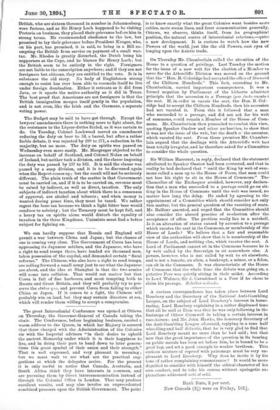On Thursday Mr. Chamberlain called the attention of the House
to a question of privilege. Last Tuesday the motion for the issue of a new writ for the election of a Member to serve for the Attercliffe Division was moved on the ground that the "Hon. B. Coleridge had accepted the office of Steward of the Chiltern Hundreds." This fact, according to Mr. Chamberlain, carried important consequences. It was a formal negation by Parliament of the hitherto admitted principle that the accession to a Peerage ipso facto vacate t the seat. If, in order to vacate the seat, the Hon. B. Col. ridge had to accept the Chiltern Hundreds, then his accession had not vacated it. From this it followed that a man who succeeded to a peerage, and did not ask for his writ of summons, could remain a Member of the House of Com- mons. Mr. Chamberlain then proceeded to combat this view, quoting Speaker Onslow and other authorities, to show that it was not the issue of the writ, but the death o the ancestor. which vacated the seat. From these premises Mr. Chamber- lain argued that the dealings with the Attercliffe writ had been totally irregular, and he therefore asked for a Committee to consider the whole question.


















































 Previous page
Previous page